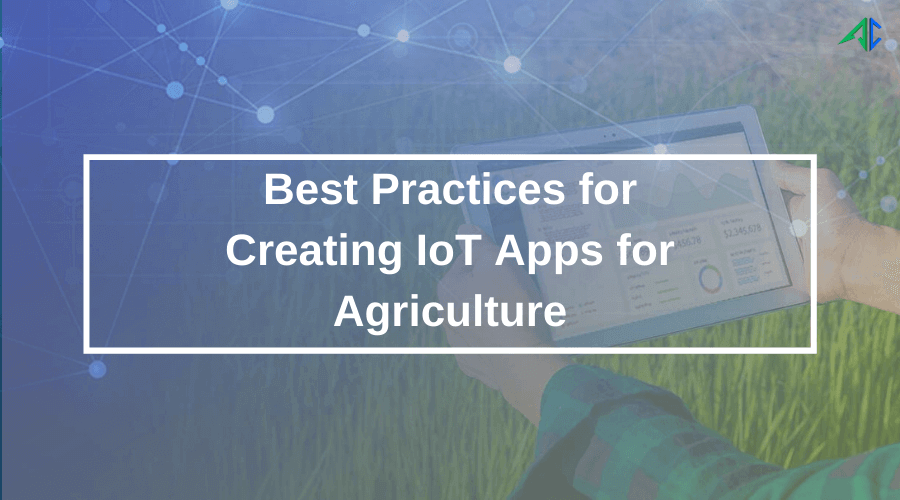Table of Contents
Are you planning to develop a mobile app with internet of things in agriculture? Explore here some of the right practices that you can follow to improve the effectiveness of your end products.
From small retail businesses to manufacturing industry, Internet of Things (IoT) is everywhere of late. As one of the most popular technologies, IoT witnessed its acceptance among many industries, and agriculture is one of those.
Many experts believe that IoT has a great future in the agriculture industry in the coming time. According to the source, the global agriculture market size of IoT is projected to reach up to $30 billion by 2023.
Those who are into an agriculture business can’t avoid the relevance of internet of things and should discover the best possible way to harness the unmatched potential of IoT, to make their operations more advanced and smart. A mobile app can be the right option for them.
A mobile app with IoT in agriculture yields a lot of benefits such as smart greenhouse, agriculture drones, precision farming, livestock monitoring, and many more. All these benefits are directly related to improve production and make agriculture business more profitable.
If you are planning to develop a mobile app with IoT in agriculture, we will let you know some crucial things that you need to keep in mind to create the right product.
Before this, let’s have a look at some common queries related to mobile apps with IoT in agriculture.
What is Smart Farming?
Smart farming is defined as the modern concept of farming management, which advocates the use of advanced technologies such as soil scanner, IoT, GPS, etc. to improve the quantity and quality of the agricultural products.
Apart from this, smart farming also helps farmers test soil conditions, measure variation within a field, and make the strategy to use fertilizers and pesticides accordingly to increase the effectiveness.
Farmers can also get an idea about the nutrition needs of animals and adjust nutrition to improve the health conditions of the animals and prevent them from getting infected from any disease.
Types of IoT Apps for Agriculture
Before stepping ahead to develop your app, you need to know about different types of mobile apps with IoT in agriculture.
- Monitoring Climate Condition
- Crop Management
- Cattle Monitoring and Management
- End-to-End Farm Management
- Greenhouse Automation
Practices to Follow to Create Mobile Apps with IoT in Agriculture
Selection of the Right IoT Platform
To develop an IoT-based application for agriculture, your first job is to choose the right platform to build the final product. You can select the platform based on multiple factors such as your specific needs, cost of the platform, technologies they support, etc.
Some popular IoT platforms are Azure IoT Suite, IBM Watson, Oracle IoT, AWS, Kaa and others. You can choose any of them you think the right option for you.
Selection of the Right Sensors
Choosing the right sensor is crucial to create an IoT app for agriculture. There are different types of sensors used in agriculture;
- Airflow sensors
- Dielectric soil moisture sensors
- Mechanical sensors
- Electrochemical sensors and more.
For sensors, you can either go with a custom development option or use the third-party sensor. No matter which option you choose, quality should be prioritized.
You can choose based on the type of information you seek to collect, the purpose of your app, etc.
Implementation of Robust Data Analytics
The importance of data analytics in agriculture is a known fact. It helps you get a detailed insight into weather forecasting, soil quality, seeds quality, market price, crop inventory management, etc.
Therefore, you need to emphasize on data analytics, while developing an IoT app for agriculture. Your product should be packed-in with a robust data analytics ability to deliver an accurate insight of all these.
It’s a great idea to implement cutting-edge technologies like machine learning, and predictive algorithms to get the action insight based on the collected information.
Speed
IoT app is meant to be fast, so is your agriculture app. Every connected device in this system should have enough range to connect and communicate with other devices easily.
The connected devices need to be able to transmit data to the main server quickly. It gives the flexibility to farmers or business owners to access the details either remotely or on the site through computer or mobile devices.
Also read: What is the Future of Augmented Reality in Mobile Apps?
Focus on Infrastructure
Infrastructure impacts the performance of a mobile app extensively. If you plan for mobile apps with IoT in agriculture, it is vital to focus on the infrastructure of your app and create it in the way so it can handle the maximum data load.
You need to set up the infrastructure of your app according to different components of your app’s service while ensuring it’s compatibility with your application.
Implement a Robust Security System
Security should be the topmost priority to make your app secure to prevent it from getting hacked. In this system, there are several devices connected within a single network. So, there are higher possibilities for potential security threats.
To enhance the security of your IoT-powered agriculture app, you can keep in mind the following crucial things.
- Use reliable sensors from an authorized vendor only.
- Choose a reliable IoT platform.
- Use protected networks.
- Implement some best practices such as two-factor authentication, obfuscation, encryption, and others to improve security.
Planning for Scalability
The scalability of a mobile app determines its relevance for long terms. Therefore, your app development service provider should plan it properly and create your IoT-based agriculture app accordingly.
You need to be clear about the functionality of your app as it’s directly related to scalability. Your app needs to be able to manage the increasing data loads, processes, devices, etc.
We would love to hear your comments relating to the post. Got some other thoughts? Drop us words through our contact page.







